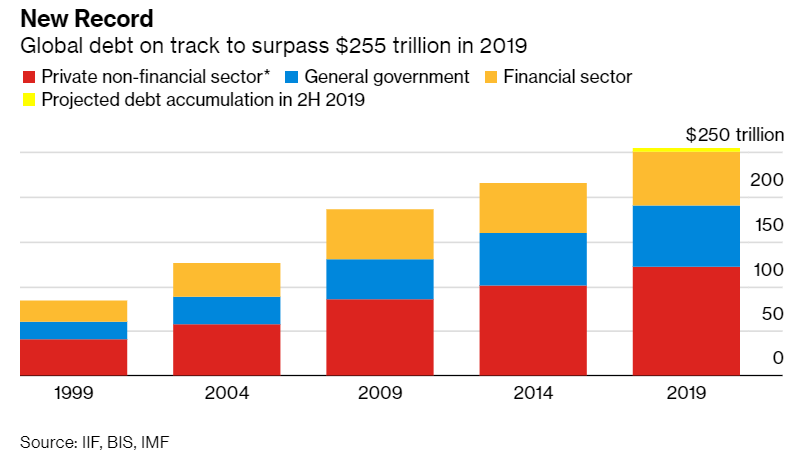The outlook for the Global Market Index’s risk premium ticked higher for a third month in a row in November. The adjustment, due to evolving market conditions, lifted GMI’s expected long-term return to an annualized 4.9% (before factoring in a “risk-free” rate). The new estimate is fractionally above last month’s forecast (4.8%) and modestly higher vs. the year-ago estimate (4.6%). GMI is an unmanaged, market-value-weighted portfolio that holds all the major asset classes (except cash).
Macro Briefing | 3 December 2019
US threatens new tariffs on French goods in response to digital tax: CNBC
France says it will retaliate over new US tariff threat: Bloomberg
Global Mfg PMI reflects growth in November–first gain in 7 months: IHS Markit
Is the fate of global economy tied to the health of US consumers?: Bloomberg
US construction spending fell in Oct but 1yr trend returns to growth
In contrast with ISM data (see below), US Mfg PMI rebounds in Nov: IHS Markit
US ISM Mfg Index continues to show mild contraction for sector in Nov: ISM
Major Asset Classes | November 2019 | Performance Review
The US stock market was the clear performance leader for the major asset classes in November. The strong gain in American shares was all the more striking in a month that was otherwise skewed to the downside.
Continue reading
Macro Briefing | 2 December 2019
UN chief: ‘War against nature must stop’: Reuters
China suspends US Navy visits to Hong Kong, sanctions US groups: Reuters
China’s mfg sector expanded by more than expected in Nov: CNBC
US mfg data in focus in today’s releases: CNBC
Euro area’s mfg sector continues to contract in November: IHS Markit
UK mfg contracts as Brexit uncertainty weighs on sector: IHS Markit
Global debt on track to rise to a record $255 trillion-plus in 2019: Bloomberg
Book Bits | 30 November 2019
● The AI Economy: Work, Wealth and Welfare in the Age of the Robot
By Roger Bootle
Summary via FT
Bootle, chairman of Capital Economics, argues that the economic effects of artificial intelligence may not be as different from those of previous technological transformations as many suppose; that the speed with which the changes occur may not be all that fast; and that, in all probability, piecemeal changes in policy, rather than a radical shift towards universal basic income, are the right response. We need to hear his arguments.
Continue reading
Off The Charts: Extreme Moves In ETFs — 29 November 2019
Today begins a semi-regular column that focuses on a handful of ETFs that have recently posted extreme changes. The playing field starts with nearly 100 equity funds (US and foreign). For a complete list, see a recent edition of The ETF Portfolio Strategist. The goal: highlighting some of the gains and losses at the outer edge of market action of late, where the odds may be slightly higher for developing quasi-reliable near-term expectations, perhaps for use in adding context to strategic-oriented return estimates. In any case, all the standard caveats still apply and so proceed accordingly.
Macro Briefing | 29 November 2019
Trump restarts talks with Taliban during visit to Afghanistan: The Hill
North Korea fires two short-range missiles in latest provocation: AP
Will US law on Hong Kong derail trade talks with China? Maybe not: NY Times
Is a tight US job market Trump’s ticket to re-election? WSJ
Signs of financial stress are rising in China: Bloomberg
Poll sees UK’s Conservatives set for big win in December election: Reuters
German retail spending tumbled in October: Reuters
Industrial output in Japan fell sharply in October: Nikkei Asian Review
Japan’s retail sales tumble after tax hike: Japan Times
US stock market begins November’s last trading day at record high:
Happy Thanksgiving!
Is The Recent Rebound In Interest Rates Fading?
For much of this year through early September a downside bias in interest rates was conspicuous. The driving force: economic pessimism. The 10-year/3-month yield curve inverted in the spring and for the most part remained below-zero, offering what is widely seen as a recession forecast. But over the last three months the yield curve turned positive and key interest rates rebounded. But economic data doesn’t look any better today vs. the macro profile of three months ago—in fact, the economic trend has weakened slightly. Is that a clue for thinking that interest rates will resume a downward bias in the final month of 2019?
Macro Briefing | 27 November 2019
US opens criminal probe into role of drug companies in opioid crisis: WSJ
China’s economy continues to slow in November: Bloomberg
Pondering the economic iron curtain that’s dividing the world: NY Times
US trade gap narrowed sharply in October: Reuters
Sales of new US homes unexpectedly fell in October: CNBC
Home prices in the US picked up in September: CNBC
Richmond Fed Manufacturing Index turned slighty negative in Nov: RF
US Consumer Confidence Index ticked lower again in November: MW





